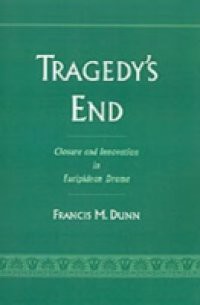Euripides is a notoriously problematic and controversial playwright whose innovations, according to Nietzsche, brought Greek tragedy to an early death. Dunn here argues that the infamous and artificial endings in Euripides deny the viewer access to a stable or authoritative reading of the play, while innovations in plot and ending opened tragedy up to a medley of comic, parodic, and narrative impulses. Part One explores the dramatic and metadramatic uses of novel closing gestures, such as aetiology, closing prophecy, exit lines of the chorus, and deus ex machina. Part Two shows how experimentation in plot and ending reinforce one another in Hippolytus, Trojan Women, and Heracles. Part Three argues that in three late plays, Helen, Orestes, and Phoenician Women, Euripides devises radically new and untragic ways of representing and understanding human experience. Tragedy's End is the first comprehensive study of closure in classical literature, and will be of interest to a range of students and scholars.

